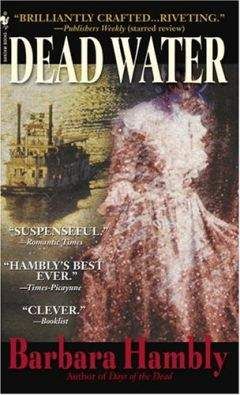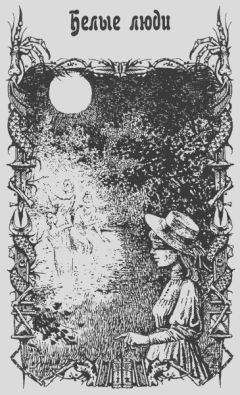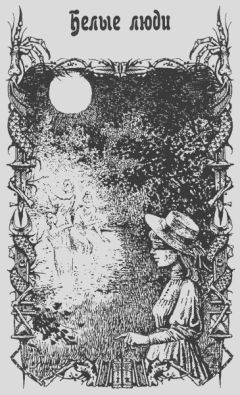Five years ago Nat Turner had risen in revolt against the whites in Virginia: he and his followers had been captured, tortured, hanged. Since that time the merest whisper of revolt was punished, brutally for whites, and for blacks with the animal fury of terrors that the slave-holders would not even admit they felt.
Judas Bredon had risked his life to smuggle his fifteen runaways up-river to Memphis. At the time he'd realized what was going on, January had not even been certain he'd have the courage to do the same.
And now he was being asked to.
And had, God help him, agreed.
God help me, he thought again, groping out to the nightstand to touch through the mosquito-bar the blue beads of his rosary. Dear God, what have I done?
As if in answer to the question he slept, and dreamed of the Silver Moon again, and of young Mr. Purlie getting on the boat. Of Gleet's gloating voice saying, She's a beauty, ain't she? as he dragged the girl forward and tore open her dress. She's yours for a thousand dollars. . . . Go ahead, feel of her. . . .
In his dream January saw again the young girl weeping with shame, and the handsome and ineffectual Mr. Quince, his hands full of copies of the Liberator, standing by shaking in fury.
But Quince is more a man than I, thought January. At least he went around the boat speaking out against what he saw. And not letting mockery stop him.
His dream changed. He was with Rose, walking along the banks of a bayou deep in the Barataria country, in the old pirate-haunted lands where Jean Lafitte and his men had roved and hidden out thirty years before. Rose, in boy's garb, had been speaking cheerfully of what her neighbors in that country, former pirates themselves, had told her about the logistics of hiding treasure—and January, and the half-dozen slaves who'd gone along with them—knelt by the side of the bayou, just where January had deduced they should, and from the water drew the old iron ship's cannon, plugged with tar, from the hiding-place where one of Lafitte's captains had left it.
In his dream he saw again the glitter of the gold in the new sun, and Rose with a necklace of blazing topazes strung around her hat.
That gold had been taken away from them—and given back.
On the other side of the bayou in his dream, January saw the woman he'd seen in other dreams: a flicker of blue robe, the gentle face that watches over the world. A halo of insubstantial stars.
She asked him, Did you think the gold was given to you to use for yourself alone?
And he knew then that God never gives anyone gold to use for themselves alone.
Then he was back in the parlor, as he had been earlier that evening, with Judas Bredon saying, . . . we're looking for people with houses.
And in the shadows, like a ghost in an aureole of ghostly stars, God's Mother winked at January and smiled. He saw that under her blue veil she wore Mrs. Fischer's green–and–cream–colored dress.
He woke and knew it was very early, not daylight, not even the early-rising summer dawn. He wondered what had waked him. The smell of smoke from the kitchen of the house next door, as their slave-woman built up the hearth-fire that would be her personal hell for another sweltering day? The clanging bell of a steamboat, far down the Rue Esplanade?
Then he heard again, from the yard below their window, a stealthy scratching, the scraping whisper of a basket laid down on the bricks.
Silent, January slipped from beneath the mosquito-bar, and by touch in the dark—for the night-lamp had long gone out—crossed the bedroom and gathered his shirt from the single chair. Slipping the garment on, he moved through the parlor on naked feet, past the pantry with its scents of candlewax and last night's coffee. He kept close to the wall, where the floor would not creak, and as he did so he heard the rustle of someone on the rear gallery.
He remembered the kitchen fire that had burst out while they were gone, started, Gabriel had said, no one knew how. . . . They were lucky the house had not burned down.
Guédé-Five-Days-Unhappy, tear the roof away from over his head. . . .
January shot back the bolt and threw the door open in time to see Queen Régine gather up her basket, preparing to leave.
The old woman whirled as January stepped out of the door and put himself between her and the stair down to the yard. In the gray fore-light of not-yet-day her black eyes glittered like a startled beast's, and she raised one skinny hand. Then she lowered it and looked down, and following her eyes, January saw, almost under his feet, a cross written in brick-dust, and the scribbled loops of a vévé in water that smelled of verbena.
He had been brother to a voodooienne long enough to know those signs meant life, not death, and his eyes went to the Queen's in questioning wonder.
She said, “You save my child.”
“What?”
“I take the cross off you,” said the old woman, “an' put blessin' on this house. You save my child. I seen you in a dream—dark, an' shoutin', an' guns firin' off. Water rushin' in, an' great black weights movin' around in that dark. You went back in that dark to save my child, and brought her up out to the light.”
My granny knows about them things. . . .
“Julie is your granddaughter?” he asked, knowing even before she nodded that it was true.
“She has the Knowin' in her,” said Queen Régine. “Since she was a little thing, she an' me, we shared the Power. But her mama take her to Church, so she don't think about Power no more, and don't want it. But between us, between her an' me, it's still alive.”
January said, “That's why you went down to see the Silver Moon off? To say good-by?”
“To kiss her,” said the Queen. “An' to put my Word on her, though she don't believe it no more; just to see her once more. Her master, he sell her to that Irish as a maid for his popotte, and they all promise, we won't sell her, we make her a good maidservant. . . . But she's afraid. And I'm afraid. I know I'll never see her again, not in the flesh. Sometimes I felt her scared so bad, scared one night. . . . But that mornin', as I was cookin' in the kitchen, her fear came on me so strong, I near fainted. And I put my head down on the table an' I see her in the dark, trapped an' scared, with things fallin' on her an' the water comin' in. . . . An' I see you. And I thought . . .”
Her few white teeth shone in a wry crone's grin.
“. . . I thought, Lord Baron Cemetery, don't let that hex take hold on him now! You went back for her,” she finished with tears swimming silver in her eyes. “You went back and you didn't have to, you didn't even know for sure she was there. But my girl, she's alive now 'cause of you. She's walkin' to freedom 'cause of you. So I put blessin' on your house, blessin' wherever you walk. Blessin' to guard you, whatever you do.”
January said softly, “Thank you, Your Majesty.”
And the little old woman winked at him, and he stepped aside to let her totter down the stair.
To himself he reflected, as she hobbled away into the half-lights and whispers of the warm, still dawn, that if he was going to start working with the Underground Railway, he was certainly going to need all the blessings he could get.
He turned, and went back into the dim sanctuary of his home.
STEAMBOATS
The steam-driven packet-boats that plied the waterways of America in the 1830s were hardly the “floating palaces” of the post–Civil War era; they, and the craft of steamboating, differed even from those of the late 1850s immortalized in Mark Twain's Life on the Mississippi. At the time of my story, the era of fancy wooden gingerbread trimmings, gilded antlers on the smokestacks, plush cabin furnishings, and calliopes lay a decade or two in the future. Even the steam whistle had yet to be invented.
Before the post-War era of the railroads, steamboats were the workaday backbone of commerce and transportation. They were plain, generally only two decks high (only later was the “hurricane” deck surmounted by the topmost “texas” deck), and resembled barns set on rafts. If they were primarily white, like later steamboats, it was only because whitewash was cheap. Staterooms were minuscule, and in the high-water periods of the cotton and sugar harvests, every square foot of deck-space was likely to be taken up with cargo: freight was given priority, and passengers came in a poor second. During the high-water months most commerce was done by the side-wheelers—larger, more powerful, and more maneuverable. Only in low water—or in shallower waters of lesser rivers and bayous—did the smaller stern-wheelers like the Silver Moon come into their own.
I have tried to describe what steamboat travel must have been like in the 1830s, when the Mississippi River was innocent of locks, flood control, uniform levees, or any variety of snag-clearance (or safety regulations for steamboat passengers). Even before the Civil War, railroads had begun to undercut the steamboats' monopoly on freight and to disrupt uninhibited navigation with bridges.
COLONEL DAVIS
In the summer of 1836, when Dead Water takes place, Jefferson Davis was twenty-eight years old and just embarking on a career as a planter at Brierfield on Davis's Bend of the Mississippi. He had been widowed less than a year before by the death of his young bride of three months, Sarah Knox Taylor (called Knox), the daughter of his former commanding officer—and future President—Zachary Taylor. Davis had already commanded troops in the Black Hawk War, though as far as anyone has ever been able to prove, he never encountered militia Captain Abraham Lincoln during that conflict.
In the mid-1840s Davis entered politics and re-married, to a young lady named Varina Howell. When the Mexican War broke out in 1846, he accepted a commission as Colonel and went on to become a war hero, a Senator, and Secretary of War to President Franklin Pierce, a career that culminated in his five-year term as the only President of the Confederate States of America.
James Pemberton became the overseer at Brierfield in Davis's absence, a position he held until his death in 1850.
Davis is universally described as a fair and kind master to his slaves.
ABOUT THE AUTHOR
BARBARA HAMBLY lives in Los Angeles, where she is at work on a novel about Mary Todd Lincoln, The Emancipator's Wife, which Bantam will publish in 2005.
Also by Barbara Hambly
A Free Man of Color
Fever Season
Graveyard Dust
Sold Down the River
Die Upon a Kiss
Wet Grave
Days of the Dead
DEAD WATER
A Bantam Book / August 2004
Published by Bantam Dell
A Division of Random House, Inc.
New York, New York
This is a work of fiction. Names, characters, places, and incidents either are the product of the author's imagination or are used fictitiously. Any resemblance to actual persons, living or dead, events, or locales is entirely coincidental.
All rights reserved.
Copyright © 2004 by Barbara Hambly
Map and illustration copyright © 2004 by Jeffrey L. Ward
No part of this book may be reproduced or transmitted in any form or by any means, electronic or mechanical, including photocopying, recording, or by any information storage and retrieval system, without the written permission of the publisher, except where permitted by law.
Bantam Books is a registered trademark of Random House, Inc., and the colophon is a trademark of Random House, Inc.
Visit our website at www.bantamdell.com
Library of Congress Cataloging in Publication Data
Hambly, Barbara.
Dead water / Barbara Hambly.
p. cm.
1. January, Benjamin (Fictitious character)—Fiction. 2. Private investigators—Louisiana—New Orleans—Fiction. 3. Natchez-under-the-Hill (Natchez, Miss.)—Fiction. 4. Free African Americans—Fiction. 5. African American men—Fiction. 6. New Orleans (La.)—Fiction. 7. Embezzlement—Fiction. 8. Steamboats—Fiction. I. Title.
PS3558.A4215D43 2004
813'.54—dc22
2004040766
Published simultaneously in Canada
eISBN: 978-0-553-90059-0
v3.0





